- Home
- Jeff Jacobson
The Boy Who Couldn't Fly Straight (The Broom Closet Stories) Page 4
The Boy Who Couldn't Fly Straight (The Broom Closet Stories) Read online
Page 4
Seattle? What did Seattle have to do with anything?
“But no! They found us. They came and found us, and now I don’t know what to do. All my good planning out the window, like that!” She screamed. The fury and fear on her breath had a smell to it, like burning grass.
She stopped, inhaling deeply. Charlie breathed in too. In spite of the rage spewing forth from this normally quiet, controlled woman, her words were giving him something to hold on to. He didn’t want her to stop.
“But Mom…who? Who are they? Who are these people?”
“You want to know who they are, Charlie? I’ll tell you!” she yelled.
He had never seen his mother so angry before, so out of control. It was odd, and oddly thrilling, even if everything about this night already filled him with terror.
“Those stupid, stupid people, out there,” she gestured out the window again, “those everyday people who worry about their mortgages and their promotions, how much foundation they can put on their faces to hide their pimples, what kind of laundry detergent to use. They tell their children things, they lie, they tell them to eat all the food on their plates or they’ll starve, to finish their homework or they’ll grow up and be poor, that if they stay out late they’ll get eaten by the boogeyman! As if they know anything about anything!”
She breathed in, her throat making a high-pitched choking sound. Charlie watched as her eyes creased shut, saw her rage melt, saw sadness wash over her face the way rainstorms washed over their orchards from the east.
“They don’t know, Charlie, those stupid, ignorant parents out there. They just don’t.”
He was getting confused. She kept talking about they and them. Were they the stupid people, or the ones who had come and found them in their house tonight?
“They just don’t know,” she repeated. Then she turned her head and dropped it onto the steering wheel. She began to sob.
He wanted to comfort her, to rub her back and say, “There, there,” the way she had to him a million times. But he was afraid that if he did, she’d stop talking. That, and the fact that they seemed well beyond comfort tonight, kept him from doing or saying anything.
She sat up, took a breath, and then looked out the window. “Charlie, those parents out there tell their kids all sorts of things about the dark, just to get them to do what they’re supposed to do. But they don’t believe any of it.”
She looked over her shoulder, out over the bed of the truck. Chills spilled over Charlie’s scalp and neck. Was something back there? Was something coming at them? Right now?
“Charlie,” she leaned in to him, her face close and startling, “things really do go bump in the night. There are things out there that make the boogeyman look like, like, like Saturday morning cartoons!” She hissed.
His stomach flipped. He wanted to to roll up the windows and beg her to keep driving, just so that whatever might be out there couldn’t catch them.
“There are things out there that, that…oh God, that kill, Charlie. And you just can’t protect yourself, or your children, from them. You just can’t!”
She slammed her hands down hard on the truck’s dashboard, and even though he watched her do it, he still jumped at the sound it made.
She took a deep breath.
“Come on, Liz. Come on! Keep moving, keep…” she muttered.
Then she turned to him. And she looked like his mother again, or at least a close facsimile of his mother.
“I won’t say any more, Charlie. So don’t ask me. I’m sorry that you’re involved in this mess. I know you think you should know more. You’ll just have to be satisfied with what I’ve told you already, which is probably too much.
“But believe you me, I am trying to get us out of here. So no more talking. I have to drive. Please buckle your seatbelt. And stop using such profane language. Even at a time like this, we can still be civil.”
He checked his seatbelt, which was not unbuckled, then nodded. Now didn’t seem to be the right time to point out that she had used some not-so-civil language herself several times today.
Charlie rested his head against the window while his mother started the engine, then checked over her shoulder to see if the road was empty. She flipped on her turn indicator, which made no sense to Charlie, then pulled out onto the road and headed north.
Chapter 5
On the two-day drive to Seattle, he barely thought about what his mother had told him. He wondered why he didn’t try to piece everything together. After all, it was just his silent mother and the endless stretch of freeway. Not that he could have figured everything out. Occasional images flashed through his mind: broken glass, his mother’s head jerking back, yellow, glowing light. But each time they progressed to a huge German shepherd talking to them, or a strange man glued to the ceiling in their kitchen, he drove the images from his mind.
He mostly slept, his head against the window. He was comfortable at night, because they always kept blankets in the back of the car, and the heater worked. But the daytime was hot. There was no air-conditioner in the Toyota, and even with the windows down, the truck’s cab grew miserable by early morning.
At one point, his mother wiped the sweaty curls from his brow. He usually flinched away when she did that, because he hated his hair and how it stood up in places, instead of lying flat against his scalp like everyone else’s.
“Remember how Ramey at the Fabric Mart used to say she’d pay gobs of money to have your hair? ‘All those blond curls, it’s not fair that you have them and I don’t!’” She laughed, mimicking Ramey’s gurgly, old-lady voice.
This time he didn’t pull away from her touch. It felt so normal, so regular, that for just one moment he could pretend they were out running errands together and not escaping from talking dogs, headed who knew where.
––––
Other than the long stretch of road and the sleeping, there were really only two incidents that stood out to him.
The first came when they were somewhere in southern Oregon. His mother pulled off of Interstate 5 in the early morning, saying that she couldn’t drive anymore. She was too tired, and didn’t want to fall asleep at the wheel and get them killed. She pulled into the parking lot of a motel and paid for a room with two double beds. She used a passport as ID, and pulled bills from a wad of cash, the likes of which he’d never seen before. He had trouble picturing his mother as someone with lots of cash and a passport, let alone someone who accepts the price given by a motel front desk clerk. She usually haggled for everything. But he was too tired to ask her about the money. He simply let her steer him toward their room, and didn’t even resist when she pulled off his shoes after he’d thrown himself flat on his bed.
It was bright and shiny in their room when he awoke the next day.
“Hey kiddo, you up?” his mother asked him. She sat on a vinyl chair near the window, shades drawn, her legs crossed, dressed in a clean T-shirt and shorts. As the sleepiness left his eyes, he saw that the yellow bruise on her cheekbone had purpled, and there were dark spots along her bare left arm, like stones across a small creek.
“Why don’t you hop in the shower, then you and I can get some pancakes at the diner across the way?” Her voice was cheerful. She was trying to act as if all of this were normal. As if they always stayed in roadside motels and ate at diners.
The hot water felt good. He’d wanted to stay in the shower a good long time, letting the pressure of the water beat at him and melt away the images crowding his head for attention. But she’d knocked on the door and told him to hurry up.
When he got out, he saw that she’d laid clean clothes out for him, like it was his first day of kindergarten.
“Hope you’re fine with what I chose,” she chirped.
It wasn’t until they walked into the diner, his mother wearing a strange pair of sunglasses which made her look like a movie star avoiding paparazzi, that he realized how hungry he was.
They sat at the counter on sticky round stools and at
e plates of eggs and pancakes. For once she said nothing about the amount of butter and syrup he used; she ate nearly as much as he did.
When the waitress refilled their coffee cups, she paused and looked at his mother’s face.
“You, uh, you alright dear?”
“We’re fine. Yes, we’re fine. Thank you,” his mother said, ducking her head.
“Say, I might be able to help a bit. You know, help?” the waitress replied. She looked to be about fifty, and her hair was a bright pink color. Her nametag read, “Darlean.”
His mother looked up from the rim of her coffee mug. She stared at the woman for a long time.
“Oh. Um…how?”
“Meet me out in the parking lot in about ten minutes,” she whispered. “Which one’s yours?”
“The blue Toyota pickup, California plates.”
–––––
They went outside, the sun already hot, and watched as Darlean walked out from the side of the building, yelling over her shoulder, “Well she’ll have to cover for a moment, Monty. For Christ’s sake!”
She walked over to them. The front of her apron was spotted with coffee.
“Honey, do you…?”
“It was just so awful,” his mother started in, her voice nothing like it had been. She started to cry.
“Oh, honey, come here,” Darlean cooed, grabbing at his mother. She wrapped her arms around her and held her tightly, while his mother fell apart.
Charlie stared at them.
Since when did his mother hug strangers?
When she came up for air, both of the women looked over at him.
“He doesn’t know,” his mother said.
Darlean nodded. “Let’s do this in the cab of your truck.”
Then she turned to him and said, “You wait right there, okay?” As if he were a toddler.
The two women climbed inside the truck. They rummaged around for a bit. He couldn’t tell what they were doing. Then they turned their heads toward the front of the truck, closed their eyes and began to move their lips. Were they praying? Charlie’s mother had never prayed before. She refused to go to church, but had always told Charlie he could go if he wanted to.
He felt the hairs prickle along the back of his neck. And it seemed like he could hear the whisper of what they were saying. Just like back home when his mother had been whispering while on the stepladder, it seemed like there were more people talking, maybe behind him or surrounding the cab. He looked over his shoulder, suddenly sure he would see a small crowd standing near him. No one was there.
The doors to the cab opened up and they both got out, Darlean smoothing down her apron.
“That should help some, honey. You okay to keep driving?”
“Yes, yes. Thank you so much. Thank you. How can I…?”
Darlean waved her hands in front of her. “Don’t even think about it, Liz. We all gotta stick together in this world, don’t we?”
Then she looked him square in the eye and said, “You take good care of yourself, boy. Take really, really good care of yourself, okay?” He nodded, not knowing what he was agreeing to.
––––-
The second incident occurred south of Portland. His mother asked him if he was hungry, then pulled off the freeway exit without waiting for a response.
“Fruit stands,” she said, reading a hand-painted roadside sign, “God, that sounds good.”
The stand itself was more of a Quonset hut resting in a graveled lot a couple hundred yards from the Interstate. A few crates of peaches, apples, and berries sat near the entrance.
His mother’s enthusiasm dwindled, replaced by her true gardening spirit.
“Half the fruit’s too early. The rest will be mushy this late in the season.”
Inside were racks of postcards, dried fruit, chocolate bars, video games. There was a whole cold section with ice cream, beer, and energy drinks.
Charlie took advantage of their odd traveling situation to choose whatever he wanted: an apple, a pre-packaged turkey sandwich, and a large bottle of soda. His mother said nothing about the amount of sugar in the bottle, or the fact that they both knew how to make better drinks at home.
She chose a small carton of blueberries, a bottle of water, and the same kind of sandwich. They walked to the checkout stand together. An old man sat at the register, eyes round as owls behind the thick lenses of his glasses. Tufts of gray hair stood up from his head like a kewpie doll, and the buttons of his light-blue work shirt were opened against the day’s heat.
“Is that all for ya?” he asked them as his mother fished for money in her purse.
Before she could answer, the man made a grunting noise and bent over. He sat up, holding the biggest hunting knife Charlie had ever seen.
“You! Get out of my store, get out of here before I GUT you!” he yelled. Both of them stood frozen to their spot. Charlie heard his mother’s quiet intake of breath.
“What? But we’re not, we’re not doing anything to…” she stammered.
“Take your kind and get out of here!” He screamed, standing up to his full height of four feet nine inches, waving the knife like a fly swatter.
His mother grabbed Charlie, pulling him to the doorway, the food they hadn’t purchased still in their hands. The carton of blueberries spilled in front of them as they ran, and they slipped on the fruit several times before making it out to the parking lot.
“Go on, shoo!” the man yelled at them, as if they were gnats.
His mother was crying before they got to the truck. Her ankles were smeared in blue. Charlie hopped in the cab without cleaning off his shoes, guessing that she wouldn’t be mad this time about dirtying the floor mats.
His mother was still crying as they drove away. He held his breath until they reached the freeway, looking over his shoulder to make sure there was no knife-wielding old man running at them, no German shepherd leaping through the air into the truck bed.
Once they were on the road again, he decided not to ask his mother what had just happened. Her pursed lips meant that she wouldn’t tell him anyway. Instead, he bit into his turkey sandwich, while the man’s words ran through his head.
Take your kind and get out of here.
What did the man mean? What, exactly, was their kind?
Frustrated with his confusion, he added the incident to his growing list of Weird Things that Keep Happening. He finished his entire sandwich in four bites, then fell soundly asleep.
Chapter 6
Charlie awoke to find them driving on an urban road flanked by industrial machinery and warehouses.
A mile ahead of them, the road changed into a huge bridge that arced up and over some sort of river or man-made waterway. The bridge appeared to run straight into a hill covered in trees and houses. To the far right sparkled a large body of water, lit blue and gold from the setting sun. Beyond the warehouses, orange stork-like cranes and multi-colored shipping crates surrounded several mammoth cargo ships. A tangle of freeway on- and off-ramps branched away from the bridge, and in the distance Charlie could make out clusters of skyscrapers.
He watched as they passed a Washington State Lottery sign promising eighty million dollars in a digital readout and asking the question, “What would you do?”
His mother took an exit off the bridge, following a sign reading, “Admiral Way.” The ramp curved to the right, where the road banked upwards into a long slope, running the length of the tree-lined hill. A digital sign tracked their speed at thirty-five, in a thirty-mile-per-hour zone.
“They’ll always catch you here going too fast, especially when you’re coming down this hill,” his mother said to him, suddenly the tour guide.
“Right up here you get a great view of the cityscape.”
She was talking as if she’d been here before. He had no idea where they were.
The road curved to the left and leveled out. They passed well-tended older-looking homes, and were soon waiting at the stoplight of a small, thriving business
district.
His mother grew more and more excited, commenting on different things she saw.
“The Emerald Market? What’s that doing there?”
“Oh my God, the Admiral Theater is still here, running their cheap movies! I’m so glad they didn’t tear it down. And over there is where I used to get my shoes shined.”
His mother used to live here? When had that happened? Charlie wondered.
They drove through what seemed like a main intersection, took a right and drove several blocks, followed by a left, and another left. The houses and their lots grew larger and prettier. Those on the righthand side sat on a bluff, high above a body of water. He wondered if it was the same one they had passed when driving over the bridge.
Then his mother pulled the truck up along the side of the road. Charlie looked out his window and saw a two-tiered iron fence enclosing a large lot filled with hedges, flowering bushes and massive trees. He could barely make out the white house through the foliage, but it appeared to be at least two stories tall. He spotted several dormer windows at the top of the second story, between the trees. The property stretched away from the road to a point extending out over the bluff. To its left, masses of blackberry bushes tumbled down the steep hill to the homes below, which must be sitting on or near the beach. Beyond the blackberry bushes, sat an empty lot covered in grass and guarded by several more tall trees.
‘Rich people live here,’ he thought to himself.
“Well honey, we’re here,” his mom said, then patted his knee. She smiled at him, and he saw her lips quivering, the way lips do when someone tries to hide nerves. “Let’s get out.”
Charlie heard a door open somewhere behind the fence as his mother got out of the truck. She stepped up onto the sidewalk, and he was surprised to see that she looked like a young girl, hands behind her back, the life-long effects of hard work and reticence momentarily washed away. He half expected her to be holding a bouquet of flowers shyly in her hands.
A woman in her late thirties or early forties with long dark hair, dressed in a full-length maroon skirt and a light-colored sleeveless blouse, opened the front gate to the house and stepped out. She was beautiful. Her eyes were deep and wide, her mouth full, and she didn’t so much stand on the sidewalk as command it. Her arms stayed at her sides, and she stared at Charlie’s mother with a clouded, distant look.

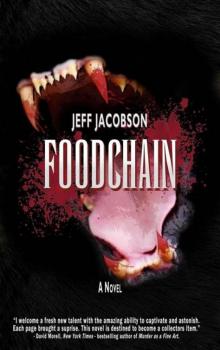 Foodchain
Foodchain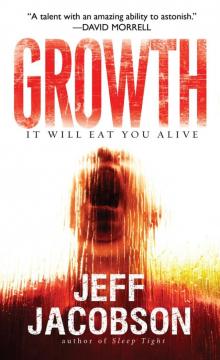 Growth
Growth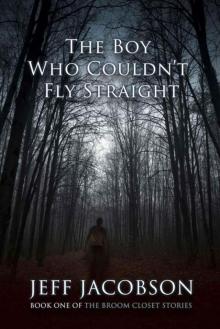 The Boy Who Couldn't Fly Straight (The Broom Closet Stories)
The Boy Who Couldn't Fly Straight (The Broom Closet Stories)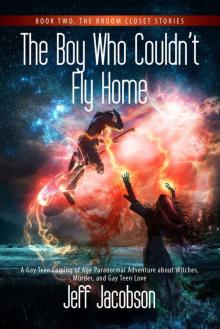 The Boy Who Couldn’t Fly Home: A Gay Teen Coming of Age Paranormal Adventure about Witches, Murder, and Gay Teen Love (The Broom Closet Stories Book 2)
The Boy Who Couldn’t Fly Home: A Gay Teen Coming of Age Paranormal Adventure about Witches, Murder, and Gay Teen Love (The Broom Closet Stories Book 2)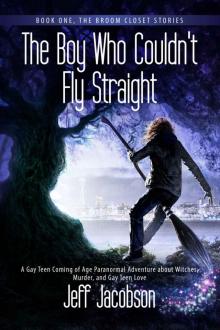 The Boy Who Couldn't Fly Straight: A Gay Teen Coming of Age Paranormal Adventure about Witches, Murder, and Gay Teen Love (Book 1, The Broom Closet Stories)
The Boy Who Couldn't Fly Straight: A Gay Teen Coming of Age Paranormal Adventure about Witches, Murder, and Gay Teen Love (Book 1, The Broom Closet Stories)